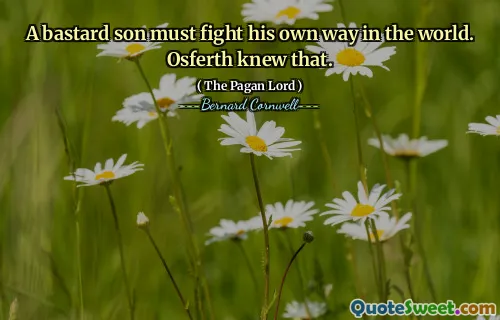
A bastard son must fight his own way in the world. Osferth knew that.
This line speaks volumes about the harsh realities faced by those born outside the bounds of traditional legitimacy, a situation laden with social stigma and challenges. The use of the term "bastard son" directly addresses issues of identity, acceptance, and self-determination, themes that are universally resonant across cultures and eras. Osferth's awareness highlights a personal acknowledgment of his marginalized status and the necessity for self-reliance and resilience in navigating a world that might otherwise overlook or undervalue him.
From a broader perspective, this quote can be seen as a reflection on societal norms and the arbitrary parameters that define worth and legitimacy. It underscores the struggle against prejudice and the drive to carve out one's own destiny despite societal constraints. The notion of "fighting one's own way" signifies courage and determination, an individual's agency in the face of adversity. This resonates deeply with anyone who has felt marginalized or compelled to overcome barriers imposed by birth, circumstance, or external judgment.
Within the context of Bernard Cornwell's historical fiction, this line also sets the stage for character development and the exploration of themes like loyalty, honor, and survival in a harsh, often unforgiving world. It encapsulates a moment of introspection and resolve, inviting readers to empathize with Osferth's plight while contemplating the broader implications of social hierarchy and personal struggle. Ultimately, it challenges us to consider how much of one's destiny is shaped by external labels versus internal will.








